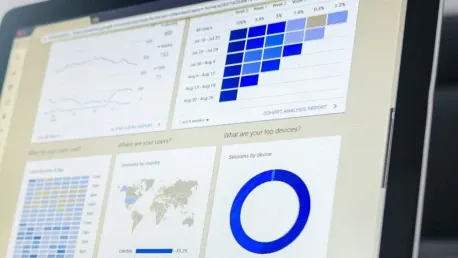Big Data has revolutionized numerous industries, and the retail sector is no exception. As the market value of Big Data reaches unprecedented heights, retailers are leveraging this technology to stay competitive and cater to evolving consumer expectations. From e-commerce giants to traditional brick-and-mortar stores, Big Data is the linchpin enabling personalized shopping experiences and catalyzing business growth. This transformative power is most evident in how retailers use detailed data insights to tailor their offerings, optimize operations, and improve customer satisfaction significantly. The ability to process vast quantities of data has unlocked new opportunities for retailers to gain a competitive edge and adapt to market shifts rapidly.
Understanding the Role of Big Data in Retail
Retailers have recognized the profound impact of Big Data over the past decade. Initially a promising concept, it is now an indispensable tool, essential for addressing diverse business challenges. The ability to process and analyze vast datasets has unlocked new avenues for enhancing customer satisfaction and driving sales. Today, retailers employ Big Data across various channels, ensuring they remain agile and informed in a rapidly changing market. By leveraging consumer behavior data, retailers can create personalized shopping experiences that meet individual customer needs, enhancing both engagement and loyalty.
One of the key benefits of Big Data in retail is the personalization of offerings. By analyzing consumer behavior, preferences, and purchasing patterns, retailers can curate personalized recommendations. This not only increases customer retention but also boosts cross-selling and up-selling opportunities, directly impacting the bottom line. The data provides insights into what customers are likely to buy next, allowing retailers to stock the right products and present them at the right time. Such precision in meeting customer needs is a powerful driver of revenue and customer satisfaction, ensuring that businesses stay ahead of the competition.
Enhancing Decision-Making with Data
Decision-making is another area where Big Data proves invaluable. Retailers can now make well-informed decisions by analyzing trends and forecasting demand. This ability to predict future market dynamics helps in mitigating risks and optimizing inventory levels. Retailers can avoid overstocking and understocking issues, ensuring they meet customer demands while minimizing costs. The insights derived from Big Data also enable retailers to react swiftly to market changes, adapting their strategies and operations to maintain competitiveness and capitalize on emerging opportunities.
Moreover, Big Data enables retailers to craft targeted marketing campaigns. By understanding customer segments and preferences, marketing strategies can be tailored to specific audiences, thereby improving conversion rates. This data-driven approach ensures that marketing efforts are both effective and efficient, maximizing return on investment. Personalizing marketing messages based on customer data enhances customer engagement and fosters brand loyalty, providing a strategic advantage in a crowded marketplace. Retailers can identify the most effective channels and messages, ensuring their marketing spend yields the highest possible returns.
Personalizing Customer Interactions and Experiences
The dynamic nature of pricing in the retail industry makes Big Data an essential tool for setting competitive yet profitable prices. Advanced algorithms analyze market data to adjust prices in real time. An exemplary case is Amazon, whose dynamic pricing tool adjusts prices every two minutes based on numerous factors, ensuring competitiveness without compromising profitability. This level of precision in pricing ensures retailers can maximize margins while offering customers the best possible prices, a key factor in maintaining customer trust and driving repeat business.
In physical stores, Big Data is pivotal in optimizing store layouts. Retailers use video analytics and heat maps to understand customer movement and product interactions. This data guides the strategic placement of products, enhancing visibility and sales. Additionally, by identifying friction points in the purchasing process, retailers can streamline the customer journey, ensuring a smoother and more satisfying shopping experience. By deploying data-driven insights to refine store layouts, retailers can create environments that encourage purchasing and enhance overall customer satisfaction, translating into higher sales and customer loyalty.
Data Collection and Security Challenges
Effective data collection is fundamental to leveraging Big Data. Retailers primarily gather data through loyalty programs and partnerships. Loyalty programs incentivize customers to share personal information in exchange for discounts and benefits. These programs operate seamlessly across both online and offline platforms, providing comprehensive customer insights. Collaboration with partners, including regulatory bodies, further enriches the data pool, enabling deeper analysis and more accurate customer profiling. This broad data collection approach is essential for creating comprehensive customer insights, driving more effective personalization and decision-making.
However, the collection of vast amounts of sensitive information poses significant security challenges. Retailers must establish robust security frameworks to protect data from cyber threats. Regular vulnerability assessments and secure data storage solutions are critical in safeguarding customer information. While some data is stored in in-house data centers, cloud storage is also used selectively for its scalability and convenience. Ensuring the privacy and security of customer data is paramount, as breaches can lead to severe financial and reputational damage. Retailers must continually invest in the latest security technologies and practices to protect their valuable data assets.
Future Perspectives: Integration of AI
Big Data has revolutionized many industries, with the retail sector being a prime example. As the market value of Big Data soars to unprecedented levels, retailers are utilizing this technology to remain competitive and meet evolving consumer expectations. From e-commerce titans to traditional brick-and-mortar stores, Big Data is the cornerstone for creating personalized shopping experiences and driving business growth. This transformative impact is most evident in how businesses exploit detailed data insights to customize their offerings, streamline operations, and significantly boost customer satisfaction. The capability to analyze and process vast amounts of data has opened new avenues for retailers to gain a competitive advantage and adapt swiftly to market changes. Furthermore, predictive analytics driven by Big Data allows retailers to forecast trends and consumer behavior accurately, thereby enabling more informed decision-making. Whether it’s inventory management or targeted marketing campaigns, the strategic use of Big Data empowers retailers to innovate and thrive in a rapidly shifting marketplace.









